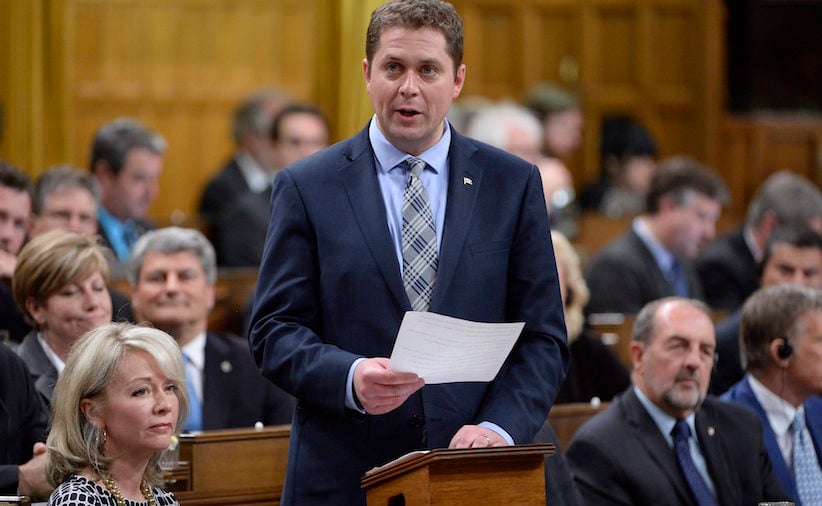Andrew Scheer and Justin Trudeau square off, finally
With rave reviews of Scheer’s press gallery dinner speech echoing in the background, the new Conservative leader took aim at Trudeau in QP
Conservative leadership candidate Andrew Scheer talks with media in Ottawa on Wednesday, Nov. 30, 2016. (Matthew Usherwood/CP)
Share
After his 2011-15 stint as Speaker of the House, Andrew Scheer felt like such a familiar, innocuous figure on Parliament Hill that his first day as Conservative leader last week didn’t give rise to the heightened anticipation that often comes with that sort of House debut.
In fact, Scheer’s first few question periods as leader, after his upset victory over Maxime Bernier to succeed Stephen Harper at the Tory helm, didn’t really count, since Prime Minister Justin Trudeau was away in Europe early last week, and only made it back to Parliament again Monday.
Which turned the afternoon’s QP into more of an event. And not only was Trudeau in his seat, Scheer was being examined with fresh curiosity by reporters and politicos alike who previously thought they had him figured. The reason for this reappraisal: two days earlier, in his speech at the annual Press Gallery Dinner, the understated Saskatchewan MP cracked some pretty good jokes, clearly upstaging Trudeau, who had been the hit of the annual ritual last spring.
READ MORE: Inside Andrew Scheer’s unlikely triumph
It’s easy to scoff, as many do, at the gallery dinner as any sort of testing ground for political leaders. Almost as easy as it is to dismiss QP, as even more do, as nothing but pointless theatrics. Yet there are undeniably important clues to be gleaned from these set-piece performances. Often they change the way political personas are cast, or alter the way the dynamic between partisan adversaries is understood.

For instance, at this past weekend’s gallery dinner, Trudeau poked fun at Scheer’s reputation for being less than scintillating, saying the Conservative colour would change from blue to beige for the next election. A perfectly forgettable line, until Scheer’s speech, moments later, began eliciting much bigger laughs, and the PM’s gibe suddenly stuck out for seeming to be less a matter of deftly defining his rival than ill-advisedly underestimating him.
Any hope that today’s squaring off in QP might turn into some battle of wits, or at least a clash of styles, was quashed by terrible events an ocean away. The House was preoccupied by the terrorist attack in London, and Scheer’s first exchange with Trudeau was on that issue, and properly sombre and respectful.
Still, when Scheer shifted gear for his next questions, his chosen topics turned out to be telling. He took aim first at the government’s planned Canada Infrastructure Bank, alleging that “the Prime Minister’s billionaire friends have talked him into” the bank, which Scheer says amounts to a vehicle for taxpayers’ money guaranteeing the profits of wealthy private investors.
Next, he turned to Trudeau’s proposed appointment of Madeleine Meilleur as official languages commissioner, contending that since she is “a life-long Liberal who supported his leadership campaign,” Trudeau should concede that Meilleur is too partisan for the job.
Trudeau’s response on the infrastructure bank was that “drawing in private capital from around the world will get more things built for Canada,” while he defended Meilleur by declaring, “The fact is we will not hold against any candidate who is qualified their past political affiliations.” But the point isn’t who won or lost the points; it’s how Scheer, in what must have been a carefully planned moment, selected his targets.
And clearly he imagines that Trudeau’s main vulnerability is the voting public’s willingness to see Liberals as too beholden to well-heeled friends and too inclined to use power to help their own. This has been Scheer’s clearest emphasis so far as Conservative leader. At every turn, he highlights his own supposed credentials as a regular guy concerned with average families, and Trudeau as the quintessential entitled elitist.
READ MORE: Andrew Scheer’s anti-elitist role model
This is a time-honoured Tory approach. Even Brian Mulroney, hardly well-cast for the Everyman role, was known to play up his blue-collar, Baie-Comeau, Que. roots. Pierre Trudeau, the current Prime Minister’s father, took the occasion of Mulroney’s first day in the House, way back in the fall of 1983, to get some laughs by observing how the new Tory leader had sometimes dressed while winning a Nova Scotia by-election. “I see that he has put away his rumpled trousers and old sweaters,” Pierre Trudeau said that day, “to be brought out at the next election.”
Actually, Mulroney pretty much stuck to suits thereafter, supplemented only occasionally by well-pressed jeans. He won two majorities, not by pretending to be like the voters he courted, but by presenting himself as a leader who knew what he wanted to do.
Scheer is far more plausible than Mulroney ever was as a stand-in for ordinary folks. Yet it’s not obvious the tactic is much more promising for him. One way to sum up those QP exchanges today is that Scheer said, “I don’t like the conspicuously successful people this Prime Minister is listening to and promoting,” and Trudeau answered, “Well, I have big ambitions for Canada and I value talent.”
That can’t be how Scheer hopes the comparison with Trudeau that he’s setting up will be perceived, of course, but it’s the risk he is taking. He must want the contrast to come off more like the reviews of their gallery dinner speeches. What worked for him that night? He sounded interesting and briefly made Trudeau look ordinary.
MORE ABOUT ANDREW SCHEER:
- How the first Conservative ballot looked across Canada
- An insider’s view of the final week of Andrew Scheer’s campaign
- 10 things to know about Conservative leader Andrew Scheer
- Tories greet new leader Andrew Scheer on Parliament Hill
- Andrew Scheer gathers with Hill Tories for first time as leader
- By electing Andrew Scheer, the Conservatives choose not to go ‘Mad’